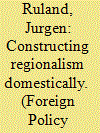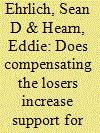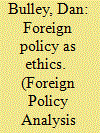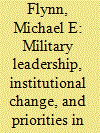|
|
|
Sort Order |
|
|
|
Items / Page
|
|
|
|
|
|
|
| Srl | Item |
| 1 |
ID:
131062


|
|
|
|
|
| Publication |
2014.
|
| Summary/Abstract |
There is a dearth of studies exploring the construction of ideas on regionalism outside Europe. This article seeks to make a contribution to close this gap. It examines the construction of ideas on regionalism in Indonesia, the largest member country of the Association of Southeast Asian Nations (ASEAN). Theoretically, the paper draws from Acharya's concept of "constitutive localization" which it develops further. It offers an alternative explanation to studies which argue that as a result of mimetic behavior, social learning, and cost-benefit calculations, regional organizations across the world become increasingly similar. While this may be the case in terms of rhetoric and organizational structure, it is not necessarily the case at a normative level. The Indonesian case shows that even though foreign policy stakeholders have increasingly championed European ideas of regional integration after the Asian Financial Crisis of 1997/1998, they have skillfully amalgamated them with older local worldviews through framing, grafting, and pruning. European ideas of regional integration thereby served to modernize and relegitimize a foreign policy agenda which seeks to establish Indonesia as a regional leader with ambitions to play a major role in global politics.
|
|
|
|
|
|
|
|
|
|
|
|
|
|
|
|
| 2 |
ID:
131060


|
|
|
|
|
| Publication |
2014.
|
| Summary/Abstract |
The political economy of trade literature argues that compensating those who lose from trade is an important component of maintaining public support for free trade, a linkage known as the compensation hypothesis or embedded liberalism thesis. Previous research has found support for many elements of the causal chain underlying embedded liberalism; however, there has been little research on the most crucial element of the causal chain, namely that compensation policies lead to increased support for trade. This article provides a direct test of the compensation hypothesis using a survey-based experiment conducted in the United States that exposes half of the respondents to knowledge of compensation programs and then asks for their opinion on trade policy. The article explores whether knowledge of compensation increases support for trade as well as who is influenced by this knowledge and, thus, provides a crucial test of the embedded liberalism thesis.
|
|
|
|
|
|
|
|
|
|
|
|
|
|
|
|
| 3 |
ID:
131061


|
|
|
|
|
| Publication |
2014.
|
| Summary/Abstract |
This article notes that while ethics is increasingly talked of in foreign policy, it remains a blindspot for foreign policy analysis (FPA). It argues that this must be rectified through a critical approach which conceptualizes foreign policy as ethics. The first section examines how even constructivist approaches, which are highly attuned to the intersubjective sphere, still generally avoid dealing with morality. The second section looks at the possibilities and limits of one piece of constructivist theorizing that explores the translation of morality into foreign policy via "norms." This demonstrates the problems that a constructivist account, with its tendency toward explanatory description without evaluation, will always face. The final section argues, through an examination of EU foreign policy (from 1999 to 2004) and its innovative use of "hospitality," that FPA must critically reassess the value of the norms and principles by which foreign policy operates in order to suggest potentially more ethical modes of encounter.
|
|
|
|
|
|
|
|
|
|
|
|
|
|
|
|
| 4 |
ID:
131058


|
|
|
|
|
| Publication |
2014.
|
| Summary/Abstract |
How does political competition among domestic actors influence foreign policy choice? Studies examining these questions often focus on the role of economic or partisan interests, and how they influence the preferences of decision makers who are subject to electoral institutions and pressures of their constituents. Less attention has been paid to how the preferences of other influential but unelected actors influence state behavior. I examine the influence of one such group by looking at how American military leaders shape decisions on military spending and force structure, while also examining how these decisions have been affected by changes to the institutions governing civil-military relations. Results indicate that military leaders occupying key positions can influence defense spending priorities in favor of their respective branches. Results also suggest the influence of military leaders has changed and is conditional upon the institutions governing the relationships between civilian decision makers and military leaders
|
|
|
|
|
|
|
|
|
|
|
|
|
|
|
|
| 5 |
ID:
131059


|
|
|
|
|
| Publication |
2014.
|
| Summary/Abstract |
Using social dominance theory and structural balance theory to analyze the political and psychological perspectives of subordinated peoples, we argue that struggles between dominant and subordinated polities are embedded in layered power structures. In such contexts, it is important to examine publics' political desires and interests in relation to their political elites' positions or choices of political tactics and allegiances. To illustrate these arguments, we used random urban samples surveyed in March 2010 to examine Lebanese and Syrian citizens' favorability toward their governments and Hezbollah (a quasi-government faction with significant relations to the governments of Iran, Syria, Lebanon, and the United States). As theorized, citizens' favorability depended on (i) how much they view their government as providing services for them, (ii) opposition to general group dominance, (iii) opposition to US oppression, and (iv) their governments' alignments vis-à-vis the US. Implications for political psychology and international relations theory are discussed.
|
|
|
|
|
|
|
|
|
|
|
|
|
|
|
|
|
|
|
|
|